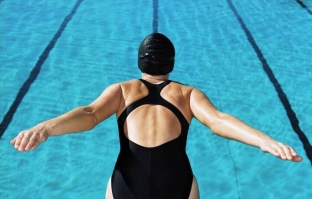Many diseases lie in wait for a person in water, both in a lake, a river, and in a pool. Each person comes to the pool with their own set of microbes and viruses that they can transmit to others, or diseases that spread quickly through water, towels, handrails, tiles. No matter how hard public bath workers try to clean and disinfect anything that could potentially carry diseases, there are other factors that affect infection. Before signing up for the pool, carefully study the issue of the rules of conduct and the necessary precautions so as not to pick up an infection and, instead of possible benefits, get significant harm from swimming in the pool. In the article, we will consider what you can get infected in the pool and what to do to prevent this from happening.
Risk group if possible to get infected
Everyone should first of all start with themselves and analyze their trip to the pool from two sides: what can I catch and can I be a carrier of the disease. In the first case, it is difficult to predict the consequences of an hour's swimming in the pool, because you do not know who swam in the water before you. In the second case, think about whether you have hidden diseases that you can pass on to another person, such as warts or a fungus. Be responsible for your own health and the well-being of others.
Who belongs to the risk group and can immediately become a victim of infection:
- Children of any age, especially those under 7 years of age who are not yet able to swim and swallow pool water;
- a person at any age after a recent illness of any nature - with a weakened immune system, the chances of developing an infection in the body increase;
- people who have wounds, cracks, cuts, calluses, scratches - the fungus quickly penetrates through them and the person becomes infected.
What can you catch in a swimming pool?
In water, contact with a sick person, objects (shoes, towels), tiles or handrails in the pool, you can become infected with the following diseases:
- deprive;
- giardiasis;
- dysentery;
- fungal infection;
- molluscum contagiosum.
What can you catch in the pool, except for the listed diseases? Also, after bathing, warts may appear on the fingers or toes. Moreover, a person after the pool may have an allergic reaction, most likely to chlorine in the water. Infection with molluscum contagiosum in adults is rare, children are most susceptible. Therefore, parents should examine the body of the child every time after swimming in the pool.
Read also: Swimming with spinal problems: advantages and disadvantages
Important! In the pool it is impossible to catch urogenital infections such as trichomoniasis, mycoplasmosis or chlamydia. The causative agents of these diseases die in chlorinated water and are not transmitted through water or contact with objects.
How can I protect myself from the danger of infection in the pool?
If the pool water is frequently changed, cleaned and disinfected, the risk of catching an infection is reduced to 1 case out of 10. Such a small, but still chance of getting sick is due to the fact that infection can occur not through the fault of the pool administration, but because that even a healthy person can be a carrier of the disease without even knowing it. If you remember the precautions in the pool, swimming will bring great benefits: weight loss, the spine and muscle corset are strengthened, the cardiovascular system is trained. After bathing, mood improves and efficiency increases.
Observe swimming and pool rules:
- select your pool carefully based on reviews and reputation;
- swim in a pool cap;
- do not visit the institution if there are blisters, sores or scratches;
- don't walk barefoot on the tiles in the pool, wear slippers;
- do not use public towels, use only your own wash items;
- take a shower before and after going to the pool;
- shower with antifungals;
- Never swallow pool water.

Water is disinfected using: ozonation, chlorination and bromination. It is impossible to use only ozone for cleaning, this method is combined with the other two.
It is interesting that the dangers lie in wait for swimmers not only in the pool, but also while taking a jacuzzi in the spa. When the bubbles form, an aerosol is formed, along with which, when inhaled, pathogenic microbes enter the lungs. The causative agents of Legionnaires' disease, Legionella, are especially dangerous. This disease is a type of pneumonia accompanied by fever and severe cough.
Don't worry about what you can catch in the pool, take all the necessary precautions right away and enjoy swimming.






Add a comment